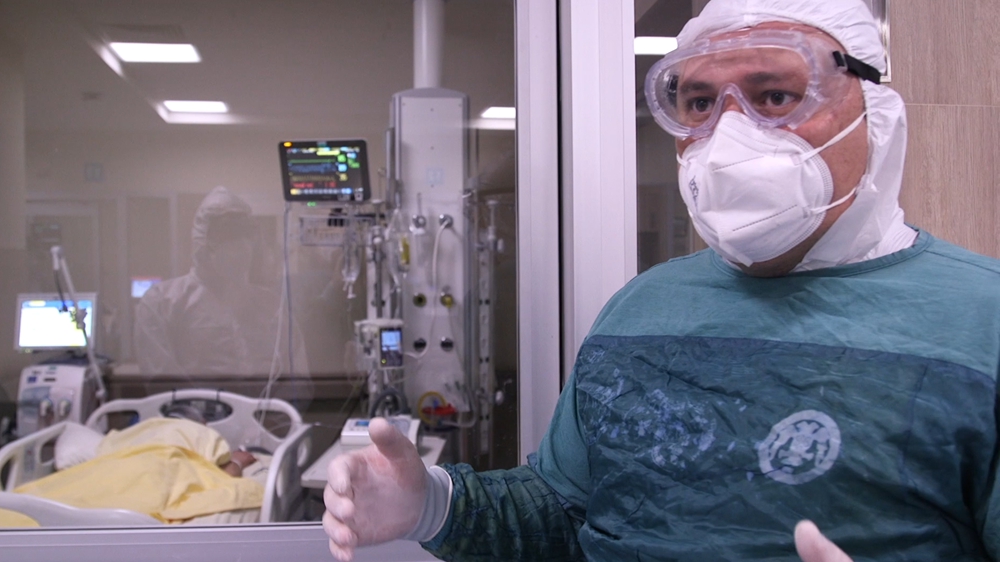
Dr. Mehmet Mustafa Altintas in full protective gear works at the Kartal Lutfi Kirdar Training and Research Hospital in Istanbul, Turkey. /CGTN
Dr. Mehmet Mustafa Altintas in full protective gear works at the Kartal Lutfi Kirdar Training and Research Hospital in Istanbul, Turkey. /CGTN
"When hope ends, coronavirus wins," said Dr. Mehmet Mustafa Altintas, deputy chief physician at one of Istanbul's busiest hospitals, the Kartal Lutfi Kirdar Training and Research Hospital, which has been designated for COVID-19 patients.
Altintas has seen the impact of the coronavirus firsthand, with the hospital having treated tens of thousands of patients since the pandemic began.
Turkey has reported over two million COVID-19 cases and 18,351 deaths linked to the disease by December 21.
Hospitals have been overwhelmed with cases, especially in Turkey's largest city Istanbul, but Altintas said that months of experience fighting the coronavirus have taught doctors a lot.

A COVID-19 patient talks with a doctor at an intensive care unit at Kartal Lutfi Kirdar Training and Research Hospital in Istanbul, Turkey. /CGTN
A COVID-19 patient talks with a doctor at an intensive care unit at Kartal Lutfi Kirdar Training and Research Hospital in Istanbul, Turkey. /CGTN
Experiences in COVID-19 treatment
Altintas said doctors have a "much better understanding of the kind of treatment to follow, who to hospitalize, and what treatment algorithm to give which patients."
Turkey's treatment approach to COVID-19 was standardized during the early stages of the pandemic. It was decided that patients would be intubated only as a last resort.
As part of the treatment, patients in intensive care are being placed in the prone position, with head slightly tilted, to increase oxygen supply and improve lung function.
After months of observation, Altintas said they also began using lung immobilization. With this method, Altintas said, "we measure the patients' oxygen saturation in different positions, then we try to stabilize the patient at the two positions with the highest levels of oxygen saturation.
"With the immobilization method, we aim to prevent the virus from spreading in the lungs and the patient from getting tired due to breathing difficulties."

Dr. Mehmet Mustafa Altintas displays a photo of his two young children in Istanbul, Turkey. /CGTN
Dr. Mehmet Mustafa Altintas displays a photo of his two young children in Istanbul, Turkey. /CGTN
Sharing pain to survive the COVID-19 impact
The pandemic has taken a toll on medical workers around the globe and the situation is no different in Turkey.
Doctors at the Kartal Lutfi Kirdar Training and Research Hospital have become family to each other, sharing their burdens, their troubles, their pain. Altintas said that they've managed to stand tall by supporting one another.
Many of his colleagues were infected by the virus, but he insisted "we're stronger together, shoulder to shoulder."
With a smile, clearly visible from under his face mask, Altintas took out his phone and showed us a photo of his two young children. He is now able to visit his family, "with precautions of course," and recharge as he continues to work relentlessly.

Dr. Mehmet Mustafa Altintas walks in the Kartal Lutfi Kirdar Training and Research Hospital in Istanbul, Turkey. /CGTN
Dr. Mehmet Mustafa Altintas walks in the Kartal Lutfi Kirdar Training and Research Hospital in Istanbul, Turkey. /CGTN
As the pandemic rages on, the need for high COVID-19 vaccination coverage is great. Turkey participated in China's experimental vaccine by Sinovac Biotech clinical trial and has signed a deal to purchase 50 million doses of its CoronaVac vaccine.
Altintas believes the CoronaVac is "the most suitable one for us considering our current situation and conditions." He said he will get vaccinated as soon as his turn comes.
He is optimistic and believes the world will enter the summer of 2021 much happier and more peaceful. "When hope ends, then coronavirus wins, that's why our hope will never end," he said.

